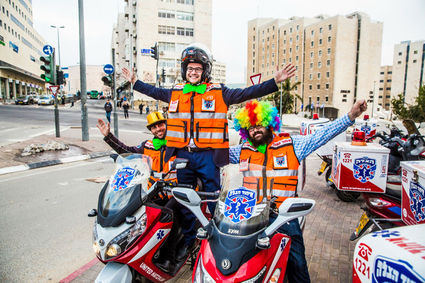Safety guide for having a happy Purim
Every year on Purim children and as well as adults suffer from a variety of injuries relating to their costumes, makeup and improvised gunpowder explosives such as caps and cap guns. The most common injuries include burns on the hands, faces, necks and legs. In order to avoid such injuries we have compiled a list of health tips that will help you and your loved ones enjoy a safe and injury free holiday.
Tips relating to toys and their uses
Every authorized toy must have a legal marking demarcating the item as safe. These markings are labelled in accordance with the law and include the information of the importer, creator, a clearly marked address, age appropriateness and instructions on how to properly use the toy. Please follow these instructions. With regards to the wide range of toys that include gunpowder, it is strongly advised to not use these toys at all, and to have adult supervision when such toys are in use All types of firecrackers should be avoided. Do not allow use of any gun, pistol, or rifle, that too closely resembles the real life version. These toys can cause aggravation and excessive reactions. Do not leave caps or cap guns in one's pocket, as they may explode due to friction and cause severe burns. Caps and all such materials should be left in their original package until they are used. Dangerous and explosive toys should only be used in open spaces and should never be aimed at any person's face.
Successful costumes are safe costumes
In general, it is advised to purchase costumes from authorized sellers and not from peddlers in open markets. All costumes should likewise be legally demarcated. Manufacturer information will be printed on the tags of costumes. For homemade costumes, avoid flammable materials such as cotton wool or feathers. Also avoid long strings or laces in the area around the neck that can cause choking. Make sure that your child removes all costume paraphernalia before they play on jungle-gyms or playgrounds.

Masks: Please remember that masks limit the field of vision of the wearer and should not be worn by children under the age of eight.
Makeup: Make sure that all makeup products have a seal of approval from the FDA. Makeup that does not include the approval, the name of the manufacturer or importer and proper warnings can be very dangerous and may cause itching, burns, and even severe allergic reactions. Check all products to make sure that they do not contain any poison or allergen in the ingredients.

Mishloach Manot
Avoid sending gifts containing small candies or gumballs to families with young children. Pay attention to possible allergic reactions when preparing and sending food gifts. It is advised to include a list of ingredients with mishloach manot if there are homemade items that include any of the Big-8 allergenic foods that are: Milk, eggs, fish, tree nuts, peanuts wheat and soy. (Crustaceans round out the Big-8 but it is highly unlikely that these will be included in mishloach manot as they are not kosher.)
Ra'ashanim - Graggers: Ensure that all ra'ashanim are unbroken and that they do not contain small plastic pieces that can create a choking hazard if they are to be used by small children.
Alcohol consumption
It is strongly advised for parents to prevent anyone underage from consuming alcohol. Alcohol affects children differently from adults and what is acceptable for adults can be severely dangerous to children. Remember that alcohol is a drug for all intents and purposes and can cause death or injury. Consumption of alcohol can cause hypoglycemia, severe decrease in blood pressure, hypothermia, excessive urination, gastric injuries, and vomiting.
Treating alcohol poisoning
The majority of treatments are supportive treatments following the ABC system. Do not try to restrain an aggressive or violent drunk person. It is important to recall that their decision making processing have been impaired. On the other hand try to ensure that they do not harm themselves or others around them. If a drunk person begins to lose consciousness check their blood sugar levels and act accordingly. Provide ample (non-alcoholic and non-diuretic) fluids in order to avoid dehydration, and call for medical assistance in order to get the person to a hospital if needed.




Reader Comments(0)